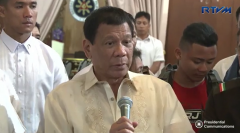
(Eagle News) — President Rodrigo Duterte on Tuesday (February 28) expressed his apologies to the German government and to the whole German nation a day after the confimation on the beheading of one of its nationals, Jurgen Kantner, by the terrorist group, Abu Sayyaf.
At the same time, he reiterated the Philippine government’s policy not to give in to the ransom demands of the terrorist group who claims to be linked to the Islamic militants, saying that this would just motivate the group to kidnap more people.
“I am very sorry that the hostage, a national of your country has been beheaded. I sympathize with the family. I commiserate with the German people,” he told reporters in Malacanang on Tuesday.
“But I said, we tried. there’s a massive operation now going on. As I’ve just announced to you we’re beginning to use the air assets (against the Abu Sayyaf),” he stressed.
The President said the Philippine government, particularly the military, really tried their best to rescue the 70-year old Kantner, who was kidnapped by the Abu Sayyaf last November.
“I would like to say something to the family and to the government that we really tried our best. The military operation has been going on for some time already,” Duterte said.
“But we have failed, that has to be admitted, there’s nothing wrong in admitting failure,” he said.
Duterte vowed that his government would crush the terrorist organization which has been engaging in kidnap for ransom activities to get funds to finance its operations.
In fact, he said, air and ground operations have had no let-up against the Abu Sayyaf. He said the Philippine military is also in the process of improving its “night flying capability” so they can pursue the terrorists even during night time.
The Abu Sayyaf group, blamed for the worst terror attacks in Philippine history, had demanded a ransom of 30 million pesos ($600,000) be paid by Sunday to spare Jurgen Kantner.
After the expiration of the deadline the jihadists, which were monitored by intelligence group SITE, posted a gruesome video showing Kantner being killed by a knife-wielding man.
Shortly after the clip appeared Philippines government envoy Jesus Dureza confirmed the death of Kantner, who was abducted from his yacht off the southern Philippines last year.
Duterte on Tuesday, when he was presented an eight-year old Filipino boy who was rescued from the Abu Sayyaf, reiterated the Philippine government’s “standing policy” not to give in to any ransom demands of the ISIS-linked group.
“There is a standing policy, because if you give in and pay mas maraming biktima at wala nang katapusan. you will just be like a,, not even an accessory…. para ka na ring principal dyan na nagbibgay ka ng pera,” he said.
“Kasi you will add another motivation for this guys to (kidnap again). Wala nang katapusan kung magbayad ka,” he said.
“It’s a matter of policy that we do not surrender to the demands of paying any ransom,” the President added.
The Abu Sayyaf, whose leaders have pledged allegiance to the Islamic State group, have been kidnapping foreigners and Christians for decades and holding them for ransom in the jungles of the strife-torn southern Philippines.
They have frequently killed hostages if their demands are not met, and last year murdered two Canadians.
They are reportedly still holding at least 19 foreigners and seven Filipino hostages, military spokesman Brigadier General Restituto Padilla said.
The group, formed from seed money provided by a relative of Al-Qaeda mastermind Osama bin Laden in the 1990s, also carried out the bombing of a ferry in Manila Bay in 2004 that claimed 116 lives in the country’s deadliest terror attack.








